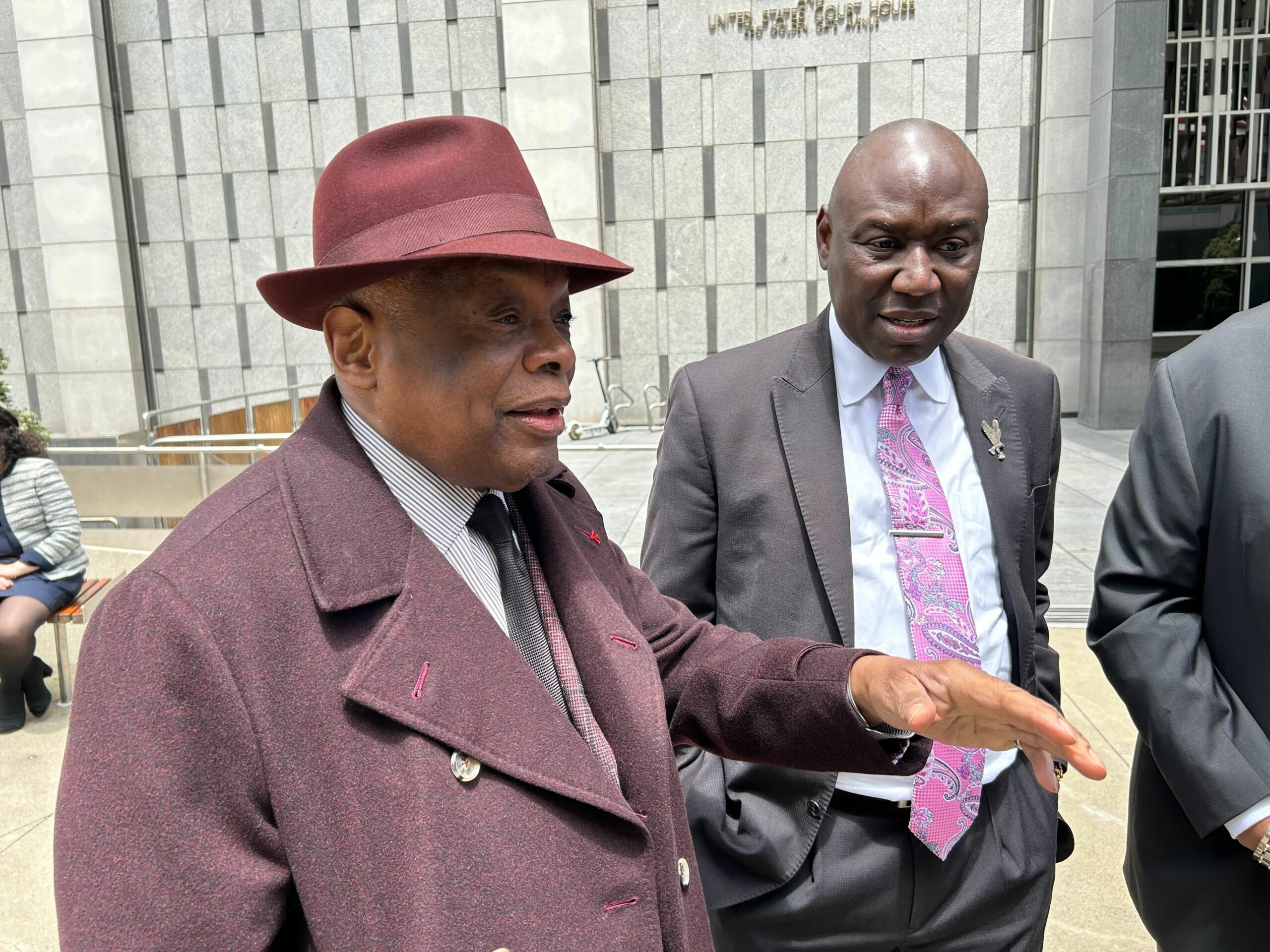A medical doctor, a business executive, a playwright and teacher and a former banker—they were all educated, economically prosperous professionals who owned their own homes. Despite that, they say Wells Fargo denied them the opportunity to refinance their mortgages or borrow money against their homes.
The reason? They believe the bank illegally discriminated against them because they are Black.
On Wednesday, plaintiffs in a lawsuit gathered in San Francisco, where Wells Fargo is headquartered, along with prominent civil rights lawyer Ben Crump and former Mayor Willie Brown, to publicize their suit against the bank.
In a speech in front of Phillip Burton Federal Building, Crump compared the litigation to Brown v. Board of Education of Topeka, which abolished racial segregation in schools.
According to Crump, the alleged discrimination by Wells Fargo may have affected 750,000 people of color across America.
“Today, we’re fighting the 21st century battle in civil rights, which is one of economic justice,” he thundered from the podium.
“This case will rise to the level of Brown v. Board of Education” and other prominent civil rights cases, Brown said. “I’m pleased that this one is going to be done right here in San Francisco.”
Different Standards
The plaintiffs in the suit, which was filed in March, allege that Wells Fargo approved significantly fewer Black borrowers for mortgages, charged them higher interest rates and frequently denied them opportunities to refinance.
Wells Fargo approved only 51.8% of Black borrowers who applied for a mortgage in 2020 while approving 67.1% of white ones, their complaint states.
That same year, the bank approved only 47% of applications to refinance from Black mortgage holders, compared with 53% from Latino applicants, 67% from Asian ones and 71% from white ones.
The plaintiffs say these disparities are greater than with other major lenders and indicate racial bias.
Wells Fargo denies engaging in discrimination.
“We are confident that we follow relevant government-sponsored enterprise (GSE) guidelines in our decision making and that our underwriting practices are consistently applied regardless of a customer’s race or ethnicity,” a spokesperson said in a statement. “These allegations against Wells Fargo stand in stark contrast to the company’s significant and long-term commitment to closing the minority homeownership gap.”
This is not the first allegation of wrongdoing against the lender.
Just a day earlier, Wells Fargo reached a $1 billion settlement with shareholders, who accused the bank of exaggerating its progress in cleaning up its act after a decade-old fraud scandal.
In December, Wells Fargo agreed to pay a $1.7 billion civil penalty and over $2 billion to customers for abuses that harmed them financially.
“It is long past time for Wells Fargo to enter into a resolution with the people who are most affected by their unethical practices,” Crump said. “And that is the marginalized minorities who were denied economic parity with white citizens.”
Unequal Treatment
Christopher Williams, one of the plaintiffs, understood something was wrong when he applied for a home equity line of credit with Wells Fargo. He had 20 years of work experience in financial services and knew how banks operate.
“I had strong employment, good income, a low debt-to-income ratio and a strong equity position in my home—all of the conditions that I thought made me a qualified borrower,” he said. “I did not consider one factor: I did not consider the color of my skin, nor my race.”
Although Wells Fargo approved him for the line of credit, they told him his interest rate would be three points above the prime rate used for banks’ most creditworthy customers. They also lowballed his credit score by 101 points, Williams said.
Williams said Wells Fargo could give him no explanation for the discrepancy.
“I went across the street to one of their competitors,” Williams said. “Same application, same income, same credit score. That lender approved my line of credit for prime minus quarter.”
Gia Gray, who lives in the East Bay, also ran into trouble with Wells Fargo.
Born in inner-city Chicago, she became a physician, found a “great job” and moved to Danville, one of the wealthiest towns in America. It was the American dream, she said.
In 2020, Gray and her husband tried to refinance their home in Danville and their two other properties in Stockton and Chicago. Then something went wrong.
“Every time I achieved a target, the target kept changing and moving,” Gray said. “To me, I felt that something was not right, and I kept getting the runaround about my Chicago property, which was not in an all-white area.”
Ultimately, Wells Fargo refused to refinance these homes, saying the Stockton property was in a bad area and the Chicago property was risky, according to the lawsuit.
Lost Opportunity
Though these plaintiffs in the case are all educated professionals, their experiences suggest other people of color may fare even worse.
According to the legal complaint, the alleged discrimination came at a time when interest rates were exceedingly low. As a result, Black mortgage holders who were denied the ability to refinance or offered a poor rate lost critical opportunities to build wealth.
Had Wells Fargo offered them the same opportunities, it could have helped close the racial homeownership gap and build Black wealth, Crump said.
Known for representing Black victims of police brutality and their families, Crump tied this suit to that work.
“Just as we have cried out against policing practices that kill Black people and Brown people, so do we denounce Wells Fargo’s racially motivated banking practices that kill Black and Brown opportunity,” he said.
For Willie Brown, the suit harkened back to his experiences growing up in segregated Mineola, Texas, and organizing a protest against housing discrimination in San Francisco as a young lawyer in 1961.
“I left Jim Crow. I left him standing on the steps of the bus stop,” Brown said. “I got here—he beat me here!”
